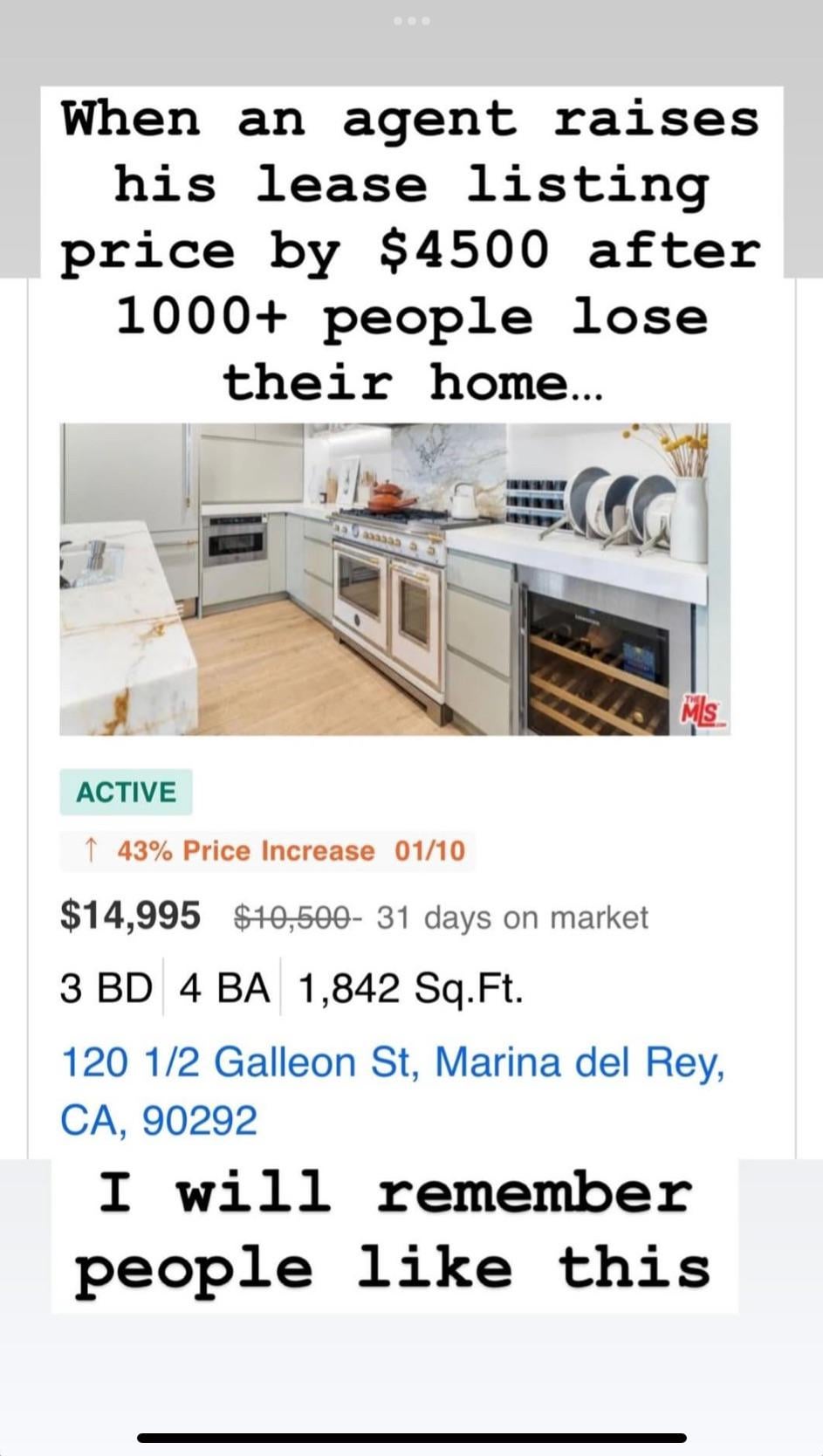- cross-posted to:
- losangeles
- aboringdystopia
- cross-posted to:
- losangeles
- aboringdystopia
They were also gonna go up in the wake of no fires.
Already happening. This was posted to c/latestagecapitalism

Three bedrooms. So even 3 couples splitting the rent 6 ways it’s $2,499.17 per person per month.
By point of comparison, my mortgage on a 3 bedroom house in Portland is $2,059.59.
There is a post-disaster price-gouging law in California preventing just this from happening. Rent is included.
https://oag.ca.gov/consumers/pricegougingduringdisasters#8C1
"Violations of the price gouging statute are subject to criminal prosecution that can result in one-year imprisonment in county jail and/or a fine of up to $10,000. Violations are also subject to civil enforcement actions including civil penalties of up to $2,500 per violation, injunctive relief and mandatory restitution.
The Attorney General, local district attorneys, and private individuals can bring actions for violations of the statute."
As a landlord (with only one house) I do not understand why a landlord would raise the rent unless they need to. Think of it this way. If I charge $675 a month and the competition jumps their price to $1,000 a month, who is everyone going to come to?
I get the pick of the best tenants. Why would I raise the rent? Should note I live where I do not have to rent to the first person that shows up.
If the competition suddenly goes to $3,000 a month and I stay at $675, and I maintain my place so it isn’t a shit hole, I’ll have lines around that block of people wanting to rent. Why would I raise my rent unless I have to?
Have to raise the rent is defined as: my costs increase, so then I raise the rent the same amount.
As a landlord (with only one house) I do not understand why a landlord would raise the rent unless they need to.
You don’t understand because you’re not a sociopathic “line must go up, moar profitier to infinity and beyond” asshole.
People have this idea that movement through time is inherently progress. Even though, in some cases, it clearly is not.
I mean this in relation to “progressing” to feudalism and capitalism. “Progressing” to the next generation’s political leadership.
If I charge $675 a month and the competition jumps their price to $1,000 a month, who is everyone going to come to?
You will get, among others, people who can afford $675 but not $1000. Compared to people who can afford $1000, people who can afford $675 but not $1000 are more likely to find themselves or already be in a precarious financial situation, which could mean missing rent payments. Compared to people who can afford $1000, people who can afford $675 but not $1000 are also more likely to suffer from mental illness as a consequence of their more precarious financial situation, which could mean neglected facilities, conflict with other tenants, pests and a host of other issues for you, the landlord.
You may be willing to both forego higher rent income and assume the increased likelihood of financial losses, and that would make you a good person, but not everyone is — at least not to the extent necessary to make that choice.
If the competition suddenly goes to $3,000 a month and I stay at $675, and I maintain my place so it isn’t a shit hole, I’ll have lines around that block of people wanting to rent.
Given the housing crisis in many of our cities and towns, you likely already have loads of people ready to rent your property, with enough reliable tenants among them. More applicants won’t benefit you, because you already have enough reliable tenants. What are you going to do with all the additional applicants? Screen each and every one of them to pick the very best one? One that is marginally more reliable than you would otherwise have found?
In fact, raising rent and prices often serves as a sort of ‘customer filter’. Instead of screening your applicants in depth, you can just check their financials and safely assume that whoever can afford a monthly rent of $3000 is also a reliable tenant.
You seem to assume a rental market made up of individual landlords. Although that is a reality in some places, most properties are rented by for-profit corporations. Such corporations compete against each other for capital; they need money from investors and investors want returns. Whenever such a corporation foregoes profit, another usually takes it and uses it to expand, often acquiring its smaller peers. Over time, this sort of natural selection yields the most ruthlessly profitable corporations.
The problem here is not that individuals make the wrong choice, but rather the framework in which they operate, the systemic incentives.
You do make some valid points there.
I appreciate the feedback.
😁 still going to undercut the competition as best I can
still going to undercut the competition as best I can
I and surely many others thank you for that. I didn’t mean to criticize your goodwill; instead I wanted to stress that our housing crisis is a systemic issue and that fixing it is beyond our individual choices and requires policy.
No offense was taken. All good.
With policy changes. I’ve looked and I’m not sure how we write a policy /policies that aren’t so screwed up that it just screwed everyone over.
How are you a landlord if you only own one house? Surely you mean two houses. Unless you rent.
Sorry should have clarified that, I have one house that I rent out. I own a different home that I live in. When I said one home, I meant I have one home for renting.
Ah, thanks for clarifying. I think most of us would see that as having two homes, one of which you rent out.
Could own a two-family home. It’s super common in my area for there to be one apartment downstairs and one upstairs.
Oh, thanks for sharing. That’s extremely rare in my experience. I only ever experienced it when I lived in Japan, in fact. Never have encountered that as a thing in the US, though I’m sure it happens here and there.
American landlords tend to live in their own single family house.
Sorry should have clarified that, I have one house that I rent out. I own a different home that I live in. When I said one home, I meant I have one home for renting.
Anything happens: rents are likely to balloon.
Rent was close to unaffordable for our two-bedroom apartment when we were in L.A. in the early 2010s. We had already been there for a decade, so our rent was still lower than a lot of our neighbors, and we were making an amount of money that would get us a decent house to rent in a lot of other places, but it was still getting to the point where we wouldn’t be able to afford it. Our rent was literally cut in half when we moved back to Indiana and we rented a house that was actually too big for us. Sure, lower standard of living, but cut in half? And now?
Supply and demand.
The price of housing he’s little to do with supply and demand. (not in the way most people think.)what if the supply is artificially decreased to drive up demand? What if every land lord company was working together to increase profits?
Whether it’s manipulated or not, it’s still supply and demand.
No, it’s price-fixing, an illegal practice.
Three little words that try and fail to excuse a whole lot of suffering.
True
Good luck out there Josh Flynn of Pardee Properties







